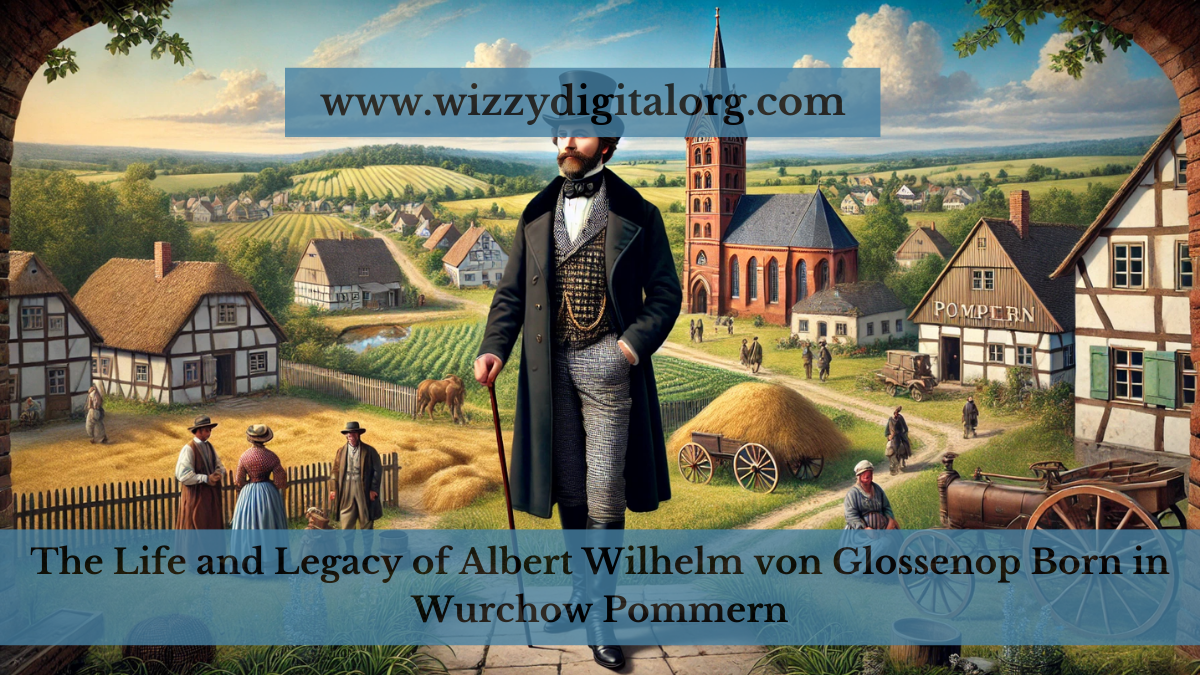The Life and Legacy of Albert Wilhelm von Glossenop Born in Wurchow Pommern
Meta Description:
Explore the fascinating story of Albert Wilhelm von Glossenop, born in Wurchow, Pommern. Learn about his life, contributions, and the historical significance of his era in this detailed and easy-to-read guide.
Introduction
Albert Wilhelm von Glossenop, born in Wurchow, Pommern, is a name that carries historical significance in the context of 19th-century Europe. Hailing from a small village in the Neustettin district, his life is a testament to the dynamic societal changes of his time. This article delves into his early life, achievements, and the historical backdrop that shaped his legacy. By understanding Albert Wilhelm von Glossenop’s story, we can gain a unique perspective on the rich tapestry of European history during the 1800s.
Early Life of Albert Wilhelm von Glossenop
Albert Wilhelm von Glossenop was born in the serene village of Wurchow, situated in the Pomeranian region of Prussia. Known today as Wierzchowo in Poland, Wurchow was a quaint settlement in the Köslin administrative district. Albert’s formative years in this village were shaped by its rural charm and the socio-economic conditions of the era.
The region of Pomerania during the 19th century was predominantly agrarian, with a growing influence of Prussian governance. Families like the von Glossenop household were often tied to the land, either as landowners or in administrative roles. It is believed that Albert’s upbringing was influenced by the region’s cultural diversity, as Pomerania was a melting pot of German and Slavic traditions.
Education and Influences
Albert Wilhelm von Glossenop’s education likely reflected the high standards of Prussian schooling at the time. Known for their disciplined and rigorous approach, Prussian schools produced many prominent figures who contributed to science, philosophy, and governance. While specific records of Albert’s education remain sparse, it is plausible that his studies included a strong emphasis on history, languages, and administrative sciences, which were pivotal for individuals from prominent families.
Moreover, the cultural and political environment of Pomerania exposed Albert to a blend of traditional values and modern ideas. This intersection of influences may have played a role in shaping his outlook and aspirations.
Achievements and Contributions
Albert Wilhelm von Glossenop’s contributions, though not extensively documented, are emblematic of the era’s values of progress and service. Individuals of his stature often engaged in administrative duties, military service, or cultural pursuits. Albert might have participated in local governance, aiding in the efficient management of Wurchow and its surrounding areas.
The socio-political landscape of 19th-century Europe was marked by rapid industrialization, shifts in governance, and cultural renaissance. Figures like Albert Wilhelm von Glossenop were integral in bridging traditional practices with emerging modern ideas, ensuring the continuity of local heritage while embracing progress.
Wurchow, Pommern: Historical Context
To understand Albert Wilhelm von Glossenop’s life, it is crucial to explore the historical setting of Wurchow, Pommern. During the 1800s, Pomerania was a region of strategic importance, bordered by the Baltic Sea and neighboring several European powers. The area experienced waves of migration, trade, and conflict, shaping its identity as a resilient and adaptable community.
Wurchow itself was characterized by its agricultural economy and close-knit social structure. Villages like Wurchow served as hubs of cultural exchange and economic activity, with residents relying on traditional crafts and farming for sustenance. The von Glossenop family’s presence in such a community suggests their active participation in its growth and administration.
Legacy of Albert Wilhelm von Glossenop
Albert Wilhelm von Glossenop’s legacy lies in his representation of 19th-century European values and traditions. His life reflects the intricate balance between preserving cultural heritage and embracing the winds of change. While direct records of his achievements may be limited, his story resonates as a symbol of resilience and adaptability.
Table: Overview of Key Facts
| Aspect | Details |
|---|---|
| Full Name | Albert Wilhelm von Glossenop |
| Birthplace | Wurchow, Pommern (now Wierzchowo) |
| Era | 19th Century |
| Region’s Characteristics | Agrarian, culturally diverse |
| Probable Contributions | Local governance, cultural heritage |
Interesting Facts About Pomerania in the 19th Century
- Cultural Diversity: Pomerania was home to German, Polish, and Slavic communities, contributing to its unique cultural fabric.
- Agricultural Economy: The region thrived on farming, with innovations in agriculture slowly being introduced during Albert’s time.
- Strategic Location: Its position along the Baltic Sea made Pomerania a crucial region for trade and military strategy.
Conclusion
Albert Wilhelm von Glossenop, born in Wurchow, Pommern, stands as a historical figure whose life offers a window into the complexities of 19th-century Europe. His story is a reminder of the interconnectedness of local communities and broader societal changes. By exploring his journey, we celebrate the enduring legacy of individuals who shaped their regions through dedication and vision.
Let Albert Wilhelm von Glossenop’s story inspire us to appreciate the rich heritage of regions like Pomerania and the unsung figures who contributed to their legacy.
FAQs about Albert Wilhelm von Glossenop Wurchow Pommern
- What is the modern name of Wurchow, Pommern, and where is it located?
- Wurchow, historically part of Pommern, is now known as Wierzchowo, located in present-day Poland.
- Did Albert Wilhelm von Glossenop have any notable descendants or relatives?
- While little is documented about his descendants, research into local genealogical archives could provide insights into his family lineage and connections.
- What role did Pommern play in the broader historical events of the 19th century?
- Pommern was strategically important during the 19th century due to its location by the Baltic Sea and its involvement in Prussian territorial and military developments.
- Were there any significant cultural or historical landmarks in Wurchow during von Glossenop’s time?
- Wurchow was known for its traditional village architecture and may have had local churches or administrative buildings reflecting the cultural heritage of Pommern.
- Are there any modern efforts to commemorate or study figures like Albert Wilhelm von Glossenop?
- Historical societies and archives in Poland and Germany actively work to preserve and research regional histories, potentially including figures like von Glossenop.






